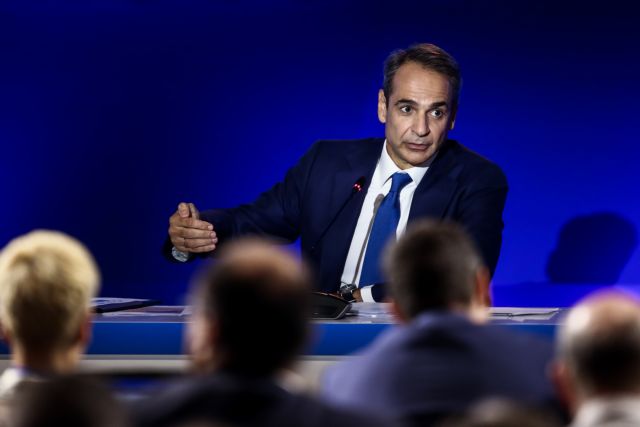By George Gilson
In a nationally televised news conference at the Thessaloniki International Fair TIF today, Prime Minister Kyriakos Mitsotakis, who is apparently not yet entirely convinced that a coalition with PASOK can be entirely ruled out, depending on the results of the upcoming, expected double general elections, combined severe pressure on Androulakis with staunch criticism of the centre-left party leader, and laid out post-electoral doomsday coalition scenarios that would repel most voters.
With opposition parties clamouring for snap elections and Mitsokakis still insisting, despite growing doubts, that he intends to serve out his full, four-year term that ends in early July, the PM is already posing to voters – as he did in his major address at the Thessaloniki International Fair (TIF) last night – a stark dilemma on who they trust more to weather the coming, protracted storm of the combined energy and inflation crises.
For nearly four years, the pro-government press has continually hammered SYRIZA for its sins while in power and for what it views as a populist opposition strategy of pledging unfeasible government handouts without a credible and viable political programme to confront the country’s major economic challenges.
‘Mitsotakis or Tsipras?’ to handle crises
Long before he came to power, Mitsotakis and a substantial segment of the media painted the SYRIZA-Independent Greeks government of Alexis Tsipras and Panos Kammenos (a curious left-wing and right-wing populist hybrid) as an economic disaster for the country, stressing that Tsipras in his first six months in power, with botched negotiations with Greece’s creditors (led by Yanis Varoufakis, now leader of the small MeRa 25 party), brought the country to the verge of expulsion from the eurozone (a contention repeatedly confirmed by top European officials involved in the arduous talks).
With that backdrop, it is no surprise, therefore, that in a clearly pre-electoral type of declaration that suggests that Greeks may go to the polls much sooner than he would have it, the PM is posing the stark dilemma “Mitsotakis or Tsipras?”
The PM dramatised the choice that voters will face in his address at TIF yesterday with a vitriolic attack on SYRIZA, declaring that either Greeks will give his conservative New Democracy government a second chance or choose “disaster” by voting for SYRIZA.
In fact, the electoral calculus is far more complicated than that, given the fact that there is a very slim chance that New Democracy will be able to garner a parliamentary majority in the next general election, or even in the very likely event of a second one, as the current political balances between parties render a viable coalition well nigh impossible
Turning the screws on Androulakis, coalition scenarios
The prospect of a coalition between New Democracy and centre-left PASOK-KINAL was long viewed by the government as the likeliest and safest bet for remaining in power, but that prospect was by all appearances blown out of the water when it was revealed in early August that the National Intelligence Service (EYP), which is under the direct political supervision of Mitsotakis and his office, was spying on Androulakis between September and December, 2021, when the latter was an MEP and a top contender for the party leadership.
The revelations created a strong but restrained backlash in ND, a popular uproar, Androulakis’ vitriolic criticism of Mitsotakis, and a spate of scathing attacks on the government from major international news outlets, from the Financial Times to the New York Times.
Slamming the surveilled party leader for exploiting his being wiretapped
At today’s press conference, instead of assuming “objective political responsibility” for the surveillance of his political opponent – as he asserted in his speech last night that he had already done – Mitsotakis declared that the spying in fact “buttered the bread” of Androulakis.
The PM effectively argued that the PASOK leader exploited his own surveillance for political benefit, because he had already ruled out a coalition with New Democracy and so he would have an excuse for not cooperating with ND to form a stable government.
He declared that Adroulakis was out of sync with his own voters due to the fact that – under the crushing politico-economic pressures of the bailout era – ND and PASOK had cooperated in a coalition government.
Change in electoral law only with SYRIZA support
Amidst rampant rumours that the government might for a second time change the electoral law to benefit from more bonus seats for the top party, Mitsotakis reiterated that he has no intention of doing so and that he will seek to achieve single-party rule in the elections.
Though he asserted that he would support such a change in the electoral law only if SYRIZA supported it, the main opposition has no reason to sign on.
“It would be irresponsibly for me to lower the bar for single-party rule below [the current] 38 percent threshold. I prefer to persuade voters that the second consecutive general election must produce a stable government with an absolute parliamentary majority for ND,” he said.
Bogeyman coalition scenario
In a clear attempt to alarm voters over the prospect of an inconceivable coalition that most of the public would find disagreeable, Mitsotakis brandished the most unlikely prospect that even if ND finished first under the current proportional electoral law, Tsipras could conceivably become prime minister with a coalition comprised of SYRZA, Pasok, Varaoufakis’ MeRa 25, and the tacit consent of the KKE Greek Communist Party (which would not vote down the government).





